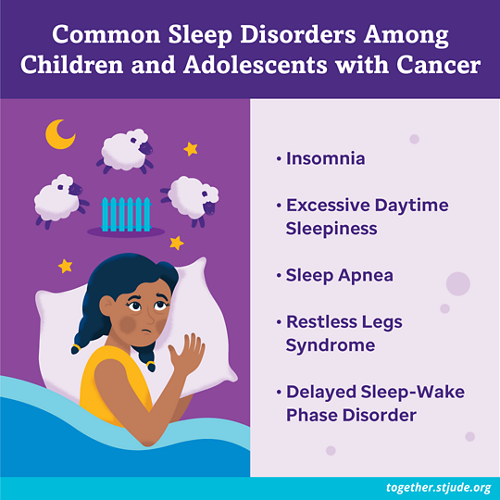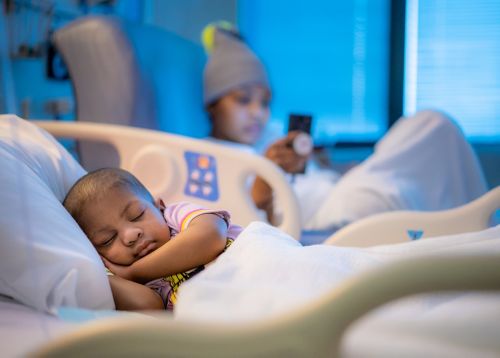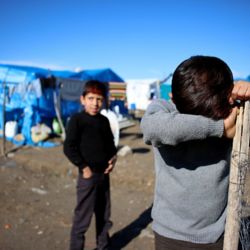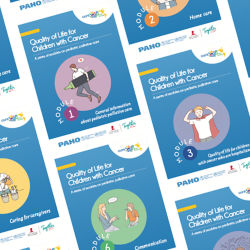Help Your Child or Teen Sleep Well During Cancer Treatment
We all know it’s important to get a good night’s sleep. But what if your child feels sick or needs medicine at night? Or sleeps all day and can’t sleep at night?
Sleep enhances physical and mental health. It affects almost every type of tissue in the body, including the brain, heart, and lungs. It boosts metabolism, immune function, mood and disease resistance. For kids with cancer, healthy sleep helps their bodies recover from chemotherapy, surgery and radiation. In fact, a night of poor sleep can cause kids to have more pain the next day.
Childhood cancer and sleep
Many kids and teens with cancer report problems with sleep, and these problems can continue after treatment.
The most common problems in children and teenagers with cancer are insomnia (trouble falling or staying asleep), excessive daytime sleepiness and cancer-related fatigue. Another sleep problem, delayed sleep-wake phase disorder, occurs almost exclusively in teens and young adults. For those with this disorder, it’s hard or even impossible to fall asleep or wake up early enough to go to medical appointments, school or work.

Kids and teens who have brain tumors near the hypothalamic-pituitary-adrenal axis are much more likely to have hypersomnia or narcolepsy, conditions that can cause severe sleepiness during the day.
Radiation therapy or chemotherapy can make it difficult for kids with cancer to sleep well and feel well-rested. Many pain medicines can cause kids to sleep during the day, and steroids (often used to treat cancer) can make it hard for kids to sleep at night.
It’s important to remember that many kids and teens with cancer are also coping with stress, worry, sadness and other negative emotional states related to diagnosis and treatment. These may result in insomnia, sleepiness, and fatigue.
Help your child or teen with cancer sleep better

- Keep a healthy sleep routine when your child is diagnosed with cancer, even if he or she isn’t going to school or work every day. Keep bedtime around the same time each night and wake your child around the same time each morning. This might be a little bit later than it was before diagnosis, and that’s OK. You just want to be sure that he or she wakes up early enough for medical appointments and other activities.
- Maintain a consistent, relaxing bedtime routine. Your child should stay away from screens at least 30 minutes before bed. Bright lights from televisions, computers, tablets, and cell phones can shift the body's clock later, making it hard to go to sleep. This may be difficult if your child doesn’t feel well enough to do non-screen activities. You could choose to read a book or listen to music instead.
- Make sure that your child avoids caffeine (coffee, soft drinks, energy drinks) especially in the afternoon and evening, which could make it hard for your child to fall asleep at bedtime.
- The bed should be used only for sleeping. Your child should avoid computer games, texting, or doing homework in bed. If your child needs to rest during the day, try to have him rest on a couch or reclining chair.
- Exposure to sunlight during the day helps create a healthy sleep/wake rhythm. Many kids and teens with cancer do not feel like playing outside or doing other outdoor activities. In this case, encourage them to sit outside in the sunlight, wearing sunscreen as needed. If your child must stay indoors, open the blinds and curtains.
- Many kids and teens with cancer feel fatigued or sleepy during the day and need to nap. Allow napping, but make sure that your child doesn’t sleep too late (after 4 p.m. or so). If your child has trouble falling asleep at bedtime, try to end naps earlier.
- If your child is awake for longer than 30 minutes (either at the beginning or in the middle of the night), he or she should get out of bed and do a relaxing activity (no TV, smartphones or digital tablets). Your child can listen to music, read a book, or try deep breathing or meditation. Keep the lights low. Your child should go back to bed when he or she feels sleepy.
What if my child still has trouble sleeping?
Cancer can be disruptive to all of your child’s routines, including sleep. If you try these tips and your child still isn’t sleeping well, talk to your medical provider. Many hospitals have health care providers — psychologists, physicians, nurses, and others — who can help your child get a good night’s sleep.
World Sleep Day
World Sleep Day is held each year the Friday before the first day of spring (known as the spring vernal equinox). It is organized by the World Sleep Day Committee of World Sleep Society and aims to lessen the burden of sleep problems on society through better prevention and management of sleep disorders.





